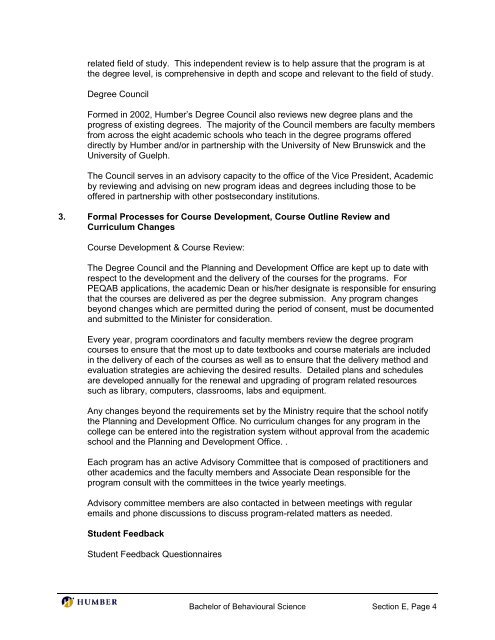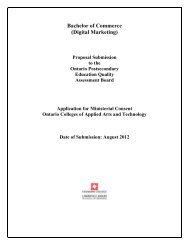Bachelor of Behavioural Science - Postsecondary Education Quality ...
Bachelor of Behavioural Science - Postsecondary Education Quality ...
Bachelor of Behavioural Science - Postsecondary Education Quality ...
Create successful ePaper yourself
Turn your PDF publications into a flip-book with our unique Google optimized e-Paper software.
elated field <strong>of</strong> study. This independent review is to help assure that the program is at<br />
the degree level, is comprehensive in depth and scope and relevant to the field <strong>of</strong> study.<br />
Degree Council<br />
Formed in 2002, Humber‟s Degree Council also reviews new degree plans and the<br />
progress <strong>of</strong> existing degrees. The majority <strong>of</strong> the Council members are faculty members<br />
from across the eight academic schools who teach in the degree programs <strong>of</strong>fered<br />
directly by Humber and/or in partnership with the University <strong>of</strong> New Brunswick and the<br />
University <strong>of</strong> Guelph.<br />
The Council serves in an advisory capacity to the <strong>of</strong>fice <strong>of</strong> the Vice President, Academic<br />
by reviewing and advising on new program ideas and degrees including those to be<br />
<strong>of</strong>fered in partnership with other postsecondary institutions.<br />
3. Formal Processes for Course Development, Course Outline Review and<br />
Curriculum Changes<br />
Course Development & Course Review:<br />
The Degree Council and the Planning and Development Office are kept up to date with<br />
respect to the development and the delivery <strong>of</strong> the courses for the programs. For<br />
PEQAB applications, the academic Dean or his/her designate is responsible for ensuring<br />
that the courses are delivered as per the degree submission. Any program changes<br />
beyond changes which are permitted during the period <strong>of</strong> consent, must be documented<br />
and submitted to the Minister for consideration.<br />
Every year, program coordinators and faculty members review the degree program<br />
courses to ensure that the most up to date textbooks and course materials are included<br />
in the delivery <strong>of</strong> each <strong>of</strong> the courses as well as to ensure that the delivery method and<br />
evaluation strategies are achieving the desired results. Detailed plans and schedules<br />
are developed annually for the renewal and upgrading <strong>of</strong> program related resources<br />
such as library, computers, classrooms, labs and equipment.<br />
Any changes beyond the requirements set by the Ministry require that the school notify<br />
the Planning and Development Office. No curriculum changes for any program in the<br />
college can be entered into the registration system without approval from the academic<br />
school and the Planning and Development Office. .<br />
Each program has an active Advisory Committee that is composed <strong>of</strong> practitioners and<br />
other academics and the faculty members and Associate Dean responsible for the<br />
program consult with the committees in the twice yearly meetings.<br />
Advisory committee members are also contacted in between meetings with regular<br />
emails and phone discussions to discuss program-related matters as needed.<br />
Student Feedback<br />
Student Feedback Questionnaires<br />
<strong>Bachelor</strong> <strong>of</strong> <strong>Behavioural</strong> <strong>Science</strong> Section E, Page 4
















